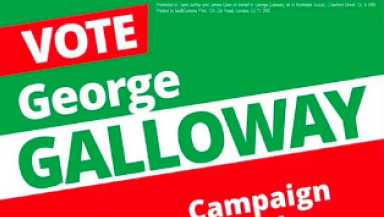
Last week, George Galloway from the Worker's Party won the Rochdale by-election with 39.7% of the vote, his fourth constituency in his political career. In second place, with 21.3%, came the Independent David Tully, a local who owns a vehicle repair shop and who began his campaign only four weeks before the vote after being disappointed by the other options. The Conservatives and Labour trailed behind with 12% and 7.7% respectively.
What does this tell us about our country's current perception of politics, particularly by those from communities that have been left behind, struggling with deprivation and poverty?
Rochdale used to be a prosperous hub for textile manufacturing, and with the construction of the canal in the early 19th century, its economy and community thrived. However, with the shift to importing goods in the mid-20th century, the area has seen significant decline. In the last census, it was placed as the 15th most income deprived place in the UK.
Now, over 40 per cent of children in the Rochdale borough grow up in poverty, the average life expectancy is nearly three years below the national average, and the local football club, for many the symbolic heart of the community, is on the brink of closing down.
Galloway campaigned under the slogan 'For Rochdale, For Gaza'. Given the issues of poverty in Rochdale, it might feel as if the focus on Gaza has overshadowed the actual needs of the local people, though both are important topics. It should cause us to consider: what actually are the roles and responsibilities of a local MP?
For myself, I feel a great sense of responsibility to my constituents and make the effort to advocate well for those who I meet door knocking, who write to me about things they care about, and everyone else I've been asked to represent. But with the rise of technology allowing us to be more connected to others globally, we now witness in real time the terrible impacts of conflict on vulnerable people, and of course that results in a depth of feeling about international issues that people want their MPs to represent on their behalf as well.
On the other hand, David Tully, the Independent local candidate, campaigned as 'a breath of fresh air', focusing on very local issues – restoring the maternity ward at the hospital, supporting local businesses, and saving Rochdale AFC. In an interview after the election, he said he campaigned to be a "voice of the people" as many were tired with the "same old routine" of mainstream politics.
I think both Tully's and Galloway's slogans highlight how the local people of Rochdale feel disillusioned by traditional party politics that seems to result in squabbling and little action, which might feel very distant from people's actual lived experience of poverty, violence, and hardship, whether here in the UK or overseas. So, whatever you think of their decision in voting for George Galloway, controversial as he is, it's important to recognise that these are people who feel let down by the political system and who are looking for hope elsewhere. We should pray that he does his best to serve them well.
Across our country, there are similar stories of towns where lack of investment has taken its toll, not only on the local economies, but on people's sense of hope, identity, and community. Less than a fifth of the Government's 'levelling up' projects in towns that were assigned funding have been completed. With inflation and higher costs, many projects have been paused or cancelled. Unfortunately, in the end, it's ordinary people who lose out.
Our God is deeply invested in people and places that are overlooked by everyone else. Jesus spent the vast majority of his life as a poor carpenter in Nazareth, a small place noted for nothing good. In fact, when Philip told Nathanael that the long-awaited saviour of the Jewish people came from there, he exclaimed with contempt, 'Can anything good come out of Nazareth?' Put another way, Nazareth would have qualified for Levelling Up funding. And yet, the hope for the entire world came from this seemingly hopeless place.
Our hope comes from knowing that God, who personally knows what it means to be overlooked, won't leave or forget about us in our suffering. He is redeeming all things, and we get to partner with him in this redeeming work throughout our everyday lives, making change where we can through both prayer and action.
Let us pray that God would continue to work through churches across the country already doing incredible work to meet people's needs in the most deprived communities. Let us pray for guidance and wisdom for our leaders, especially with the announcement and debating of the Spring Budget over the next week, that their decisions would come from caring deeply for those communities who need investment. And let us pray that those from overlooked communities would know that they haven't been forgotten by God, that they would see his loving kindness even in their hardship.













